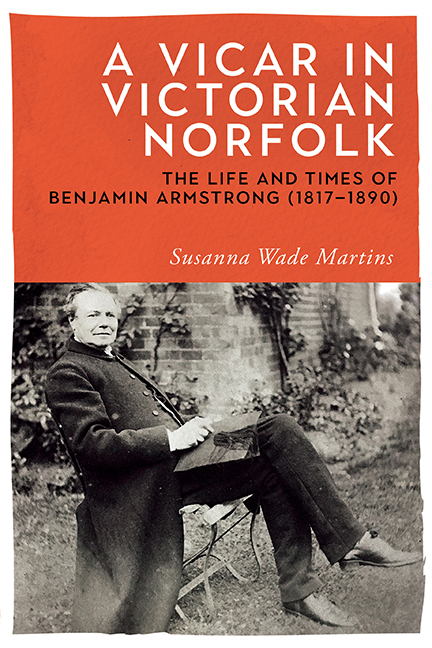Book contents
- Frontmatter
- Contents
- List of Illustrations
- Acknowledgements
- Foreword
- Author's Note
- Map
- Introduction
- I The Early Years
- 1 Early Life
- 2 The Move to Dereham
- II Public Life
- 3 The Norfolk Clergy
- 4 Church Life
- 5 The Building Legacy
- 6 Schools
- 7 Town Life
- III Family and Friends
- 8 Family Life
- 9 Friends
- IV Later Life
- 10 The Later Years
- 11 Armstrong: A Man of His Time
- Bibliography
- Timeline
- Index
Foreword
Published online by Cambridge University Press: 14 August 2020
- Frontmatter
- Contents
- List of Illustrations
- Acknowledgements
- Foreword
- Author's Note
- Map
- Introduction
- I The Early Years
- 1 Early Life
- 2 The Move to Dereham
- II Public Life
- 3 The Norfolk Clergy
- 4 Church Life
- 5 The Building Legacy
- 6 Schools
- 7 Town Life
- III Family and Friends
- 8 Family Life
- 9 Friends
- IV Later Life
- 10 The Later Years
- 11 Armstrong: A Man of His Time
- Bibliography
- Timeline
- Index
Summary
I was a curate in Peterborough in the mid-1970s when I first discovered Benjamin Armstrong's diaries. Scouring a second-hand bookshop I found the extracts chosen by his grandson Herbert, vicar of St Margaret’s, King's Lynn (now King's Lynn Minster), during the Second World War. This selection, published in 1963, contained a masterly introduction by Owen Chadwick, placing Armstrong within the context of the Victorian church and wider society.
Susanna Wade Martins has further enlarged our understanding of the diarist by writing as full a biography as the sources permit. Armstrong deserves to be remembered both for his own qualities and as a representative of many clergy of his generation who exhibited a new pastoral zeal alongside a desire for the highest standards in public worship. It was a new age of spiritual seriousness in the Church of England. Armstrong did not seek novelty but the recovery of the Catholic and sacramental character of his church expressed in the beauty of holiness and service to the poor.
Four decades ago I was immediately drawn to Armstrong. He was the sort of priest I admired. His commitment to daily public worship was one shared in my council estate parish, where there was a Eucharist every day, something Armstrong would have barely imagined possible. He had served in Dereham for fourteen years before even introducing a weekly service of Holy Communion. It was upon the dedication and vision of Victorian clergy like Armstrong that the twentieth-century Church of England was built.
Prior to discovering Armstrong I had already read the diaries of another Norfolk clergyman, James Woodforde of Weston Longville. I felt no connection with Woodforde at all. He seemed not merely a remote figure (though he was both in time and social circumstance) but someone who did not exercise a ministry remotely akin to my own. Armstrong, writing only half a century after Woodforde, inhabited a world I recognised. It's a lesson in the rapidity of change in the Church of England in the nineteenth century.
Clerical diarists are not a scarce breed. Woodforde, Witts, Kilvert and others were mostly rural clergymen. Armstrong is different. He may not have been a city priest, but Dereham was a relatively populous and growing market town parish. He did not need to write a diary to fill his time. His was no leisured life.
- Type
- Chapter
- Information
- A Vicar in Victorian NorfolkThe Life and Times of Benjamin Armstrong (1817–1890), pp. ix - xiiPublisher: Boydell & BrewerPrint publication year: 2018



